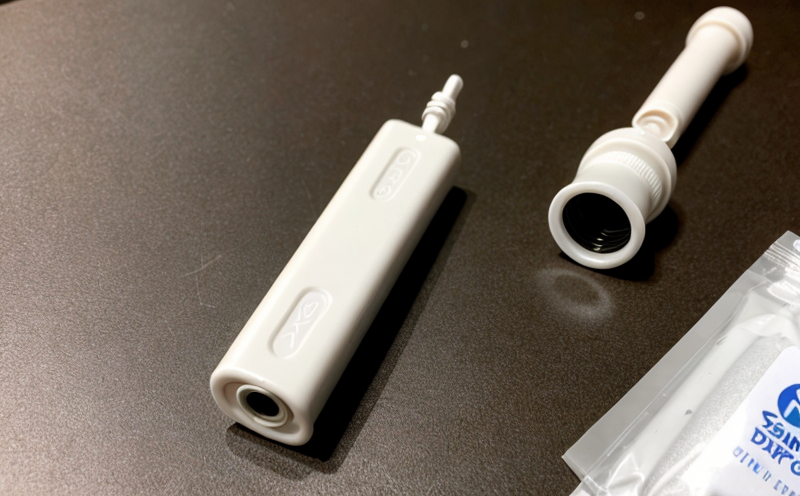ASTM F88 Seal Strength Testing of Single-Use Device Packaging
The ASTM F88 standard provides a comprehensive framework for evaluating the seal integrity and strength of single-use device (SUD) packaging. This service ensures that the seals are robust enough to protect against contamination, maintain sterility during storage and transport, and withstand various environmental conditions.
Seal strength is crucial in ensuring that SUDs meet regulatory standards such as those set by the US FDA, ISO 11607-3, and other global bodies. The ASTM F88 test method simulates real-world scenarios to assess how well the packaging can endure stresses like handling, storage, and transportation. This is particularly important for medical devices that rely on sterile conditions during use.
The testing process involves subjecting the sealed packages to a specified force until failure occurs. The critical parameters include the type of sealant used, the material composition, the geometry of the package, and environmental factors like temperature and humidity. Understanding these variables is essential for ensuring accurate test results that reflect real-world performance.
During specimen preparation, care must be taken to ensure that the packaging is representative of actual product conditions. This includes using appropriate materials, adhering to correct assembly techniques, and maintaining consistent environmental controls during testing. The seal strength tester applies a constant or cyclic force to simulate potential stressors encountered in manufacturing and distribution.
The ASTM F88 method also considers the effects of different packaging configurations on seal integrity. This is important because various types of seals (e.g., heat-sealed, adhesive-based) may behave differently under similar conditions. By incorporating these considerations into the test protocol, laboratories can provide more accurate and reliable results.
Environmental factors play a significant role in determining the reliability of SUD packaging. High temperatures and humidity levels can accelerate degradation processes, potentially weakening seals over time. Therefore, ASTM F88 includes procedures to evaluate how well the packaging holds up under these conditions. This helps manufacturers design packages that are both effective and durable.
Another key aspect of ASTM F88 testing is its focus on preventing contamination. Proper sealing ensures that the contents remain sterile until they reach the point of use, which is critical for maintaining patient safety. By rigorously assessing seal strength using this standard, laboratories contribute to enhancing overall product quality and compliance with regulatory requirements.
The ASTM F88 test method has been widely adopted due to its ability to provide consistent and reproducible results across different facilities. This consistency is vital for ensuring that all parties involved—manufacturers, regulators, and end-users—are working toward the same objectives. Moreover, adherence to this standard facilitates smoother interactions between stakeholders by establishing a common language and set of expectations.
- Ensures compliance with FDA regulations
- Supports ISO 11607-3 guidelines
- Promotes consistent quality across production facilities
- Aids in maintaining sterile conditions during transport and storage
Benefits
Implementing ASTM F88 seal strength testing offers numerous advantages for companies involved in the development, manufacturing, and distribution of single-use medical devices. One significant benefit is improved product quality, which translates directly into enhanced patient safety. By ensuring that seals are strong enough to withstand various stresses without compromising sterility, manufacturers can reduce the risk of contamination during use.
Another advantage lies in increased efficiency within supply chains. When all parties involved adhere to consistent testing protocols like ASTM F88, there is less likelihood of discrepancies or misunderstandings regarding product integrity. This leads to smoother operations throughout the entire lifecycle of a medical device—from development through final delivery to healthcare providers.
Furthermore, compliance with such standards helps companies meet regulatory requirements more easily. As regulations evolve and become stricter globally, having reliable test methods in place can help organizations stay ahead of changes without significant disruption. Additionally, demonstrating adherence to recognized standards like ASTM F88 can build trust among customers and stakeholders.
Lastly, performing ASTM F88 seal strength tests contributes positively to brand reputation by showcasing commitment to excellence in manufacturing practices. Consumers today are increasingly aware of the importance of hygiene and safety when it comes to medical products. Companies that demonstrate their dedication through rigorous testing not only protect public health but also earn goodwill from consumers who appreciate such efforts.
Environmental and Sustainability Contributions
- Reducing waste by ensuring proper disposal of expired or unused single-use devices
- Promoting the use of recyclable materials in device packaging to minimize environmental impact
- Educating stakeholders on best practices for sustainable healthcare solutions
Use Cases and Application Examples
The ASTM F88 seal strength testing service finds application in various stages of the medical device lifecycle, including research & development (R&D), manufacturing, quality assurance (QA), and compliance departments. During R&D, this test helps identify potential weaknesses early on so that design improvements can be made before large-scale production begins.
In manufacturing facilities, regular ASTM F88 testing ensures consistent quality among batches of devices. This is especially important for high-volume productions where even minor variations could have significant impacts downstream. For QA departments, these tests serve as a final check point before releasing products to market, providing an additional layer of assurance about their integrity.
Compliance officers benefit from ASTM F88 testing because it provides objective evidence needed to demonstrate adherence to relevant regulations and standards. This can be particularly useful during audits or when responding to inquiries from regulatory bodies.





